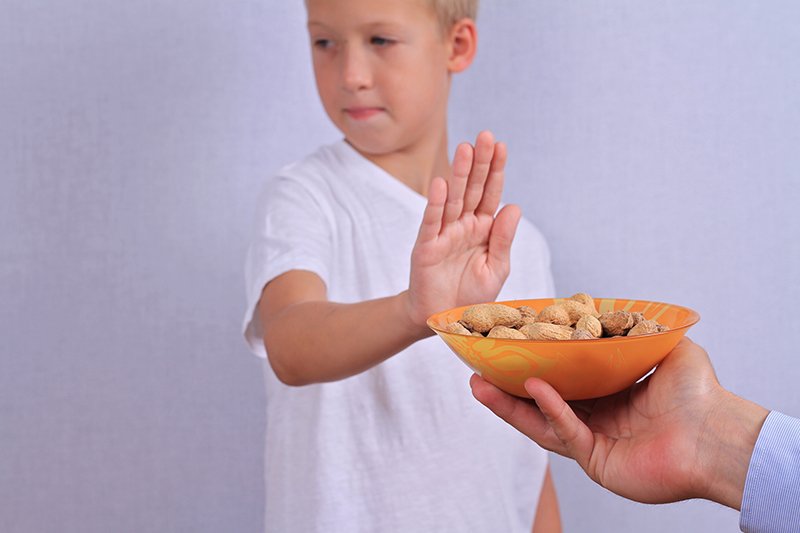Allergy Awareness Week aims to raise awareness about allergies, their impact on individuals’ health and well-being, and the importance of understanding, managing, and preventing allergic conditions.
Allergy Awareness Week typically takes place in the seasons when many people experience seasonal allergies due to increased pollen levels in the air.
Book your paediatric blood test
What are the different types of allergies?

Allergies are immune responses by the body to substances that are typically harmless. Some common types of allergies include:
- Environmental allergies: These are triggered by substances in the environment, such as pollen, dust mites, mold spores… These allergies can cause symptoms such as sneezing, runny or stuffy nose, watery eyes, coughing, and skin rashes.
- Food allergies: These are triggered by certain foods. Food allergies can cause a wide range of symptoms, including hives, itching, swelling of the lips, tongue or throat, difficulty breathing, nausea, vomiting, diarrheas, and in severe cases, anaphylaxis, a life-threatening allergic reaction.
- Drug allergies: These are triggered by medications, such as antibiotics, nonsteroidal anti-inflammatory drugs (NSAIDs), and certain types of chemotherapy drugs. Drug allergies can cause symptoms ranging from mild skin rashes to severe reactions like anaphylaxis.
- Insect allergies: These are triggered by insect bites or stings, such as those from bees, wasps, hornets, ants, and mosquitoes. Insect allergies can cause localised swelling, itching, and redness at the bite or sting site, or in severe cases, systemic reactions like anaphylaxis.
- Skin allergies: These are triggered by contact with certain substances that cause skin irritation or inflammation, such as latex, nickel, cosmetics, soaps, and detergents. Skin allergies can cause symptoms like redness, itching, rash, and blisters.
- Respiratory allergies: These are triggered by irritants that affect the respiratory system, such as smoke, pollution, strong odours, and chemical fumes. Respiratory allergies can cause symptoms like coughing, sneezing, runny or stuffy nose, difficulty breathing, and chest tightness.
- Seasonal allergies: These are triggered by seasonal changes, usually due to pollen from trees, grasses, or weeds. Seasonal allergies, also known as hay fever or allergic rhinitis, can cause symptoms like sneezing, runny or stuffy nose, itchy or watery eyes, and coughing.
It’s important to note that allergic reactions can vary in severity, ranging from mild discomfort to life-threatening reactions. If you suspect you have an allergy, it’s important to consult with a healthcare professional for proper diagnosis and management.
Childhood Food Allergy

This year Allergy Awareness Week’s topic is on childhood food allergy, with a focus on the weaning journey for parents of babies with food allergies.
What are the signs my child has a food allergy?
Typically, in a classic food allergy, symptoms manifest within 30 to 60 minutes of consuming a specific food, although it is rare for symptoms to occur hours later.
Adverse reactions to foods can take various forms, but when referring to a “food allergy,” it usually pertains to immediate allergic reactions triggered by an allergy antibody, which could potentially result in anaphylaxis. Allergic reaction symptoms can vary among individuals, but may include:
- an itchy mouth
- a sore or itchy throat
- stomach discomfort
- vomiting
- diarrhoea
- hives
- breathing difficulties
- changes in voice.
Symptoms such as breathing trouble or a change in voice are particularly concerning, as they may indicate more severe reactions. While fatalities from food allergies are rare, there is a possibility of a severe reaction being fatal, albeit very uncommon.
The most common children food allergies
- Cow’s milk allergy
- Egg allergy
- Peanut allergy
- Tree nut allergy
- Fish and shellfish allergies

It’s important to note that food allergies can vary in severity, and some children may outgrow their food allergies as they get older, while others may have lifelong allergies. If you suspect your child has a food allergy, it’s essential to consult with a healthcare professional for proper diagnosis, management, and guidance on avoiding allergens.
Book an appointment with a paediatrician
- Book a blood tests: Meditsimple proposes allergy blood tests special for children.
- Avoid the allergen: Once the allergen has been identified, it’s crucial to avoid it completely in your child’s diet. Read food labels carefully and educate yourself about common hidden sources of the allergen in foods. Be cautious when dining out or when others prepare food for your child
- Educate your child: Depending on your child’s age, educate them about their food allergy in a way that is appropriate for their understanding. Teach them to recognise the signs and symptoms of an allergic reaction and to avoid sharing food with others.
- Inform caregivers and schools: Inform your child’s caregivers, including daycare providers, school staff, and other parents, about your child’s food allergy. Provide them with the necessary information about your child’s allergens, emergency action plan, and any medications that need to be administered.
- Stay vigilant: Regularly monitor your child for any signs of an allergic reaction and seek immediate medical attention if they develop symptoms.
Managing a food allergy requires careful vigilance and proactive measures to prevent accidental exposure to allergens and to respond effectively in case of an allergic reaction. Working closely with healthcare professionals, educating your child, and informing caregivers and schools are important steps in keeping your child safe with a food allergy.
Book your paediatric blood test
References:
https://www.awarenessdays.com/awareness-days-calendar/allergy-awareness-week-2023/

